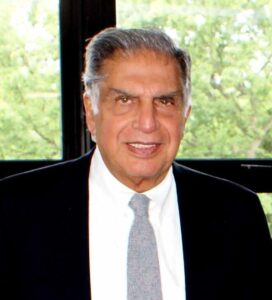
Ratan Tata Tata Group
- 0
Ratan Tata: The Visionary Leader and Philanthropist

Introduction Ratan Tata, a name synonymous with trust, integrity, and visionary leadership, is one of the most revered business leaders in India. Born on December 28, 1937, into the illustrious Tata family, he served as the chairman of Tata Sons, the holding company of the Tata Group, from 1991 to 2012, and again as interim chairman in 2016-17. Under his leadership, the Tata Group transformed into a global conglomerate, expanding its reach and influence across industries such as steel, automotive, telecommunications, and hospitality. Beyond business, Ratan Tata is celebrated for his philanthropy and commitment to nation-building.
Early Life and Education
Ratan Tata was born in Mumbai (then Bombay) to Naval Tata and Sooni Tata. His early education was at the prestigious Cathedral and John Connon School in Mumbai. He later moved to the U.S., where he graduated from Cornell University with a degree in Architecture and Structural Engineering in 1962. Following this, he attended the Advanced Management Program at Harvard Business School in 1975.
Rise to Leadership in the Tata Group
Ratan Tata joined the Tata Group in 1961 and initially worked on the shop floor of Tata Steel, shoveling limestone and handling blast furnaces. His humble beginning in the organization showcased his commitment to understanding the company’s operations at every level.
In 1991, he succeeded J.R.D. Tata as the chairman of Tata Sons. Under his leadership, the group underwent a significant transformation. Some of his most notable achievements include:
- Global Expansion: Ratan Tata’s tenure saw the Tata Group expanding its footprint across the globe. Landmark acquisitions include:
- Tetley Tea (2000): Acquired by Tata Tea, making it one of the world’s largest tea companies.
- Jaguar Land Rover (2008): Tata Motors’ acquisition of the British luxury car brands, which turned out to be a resounding success.
- Corus Group (2007): Tata Steel’s acquisition of the Anglo-Dutch steelmaker, which was one of the largest acquisitions by an Indian company at that time.
- Diversification: Under Ratan Tata, the Tata Group diversified its businesses. It ventured into new sectors such as telecommunications with Tata Teleservices and the technology sector with Tata Consultancy Services (TCS), which became a global IT giant.
- Tata Nano: One of Ratan Tata’s most ambitious projects was the launch of the Tata Nano in 2008, the world’s cheapest car priced at INR 1 lakh (approximately $2,000). Though commercially it did not achieve the expected success, it demonstrated Tata’s commitment to innovation and making transportation affordable for the masses.
Leadership and Vision
Ratan Tata’s leadership style is often described as transformative, visionary, and people-oriented. He steered the Tata Group towards modernization and globalization while maintaining the core values of the organization—integrity, social responsibility, and ethical business practices.
Key aspects of his leadership include:
- Focus on Innovation: Ratan Tata always emphasized the importance of innovation. The Tata Nano project, while commercially challenging, exemplified his desire to think beyond conventional limits.
- Employee-Centric Policies: During his tenure, he introduced progressive policies that benefited employees, ensuring that the Tata Group remained a trusted and preferred employer.
- Risk-taking Attitude: His decisions to acquire global brands like Jaguar, Land Rover, and Corus were seen as bold moves that helped position Tata Group on the global map.
Philanthropy and Social Impact
Ratan Tata’s contribution to society extends beyond his business achievements. As the chairman of Tata Trusts, one of India’s oldest and most significant philanthropic organizations, he has overseen contributions in areas like healthcare, education, rural development, and environmental sustainability.
- Healthcare: Tata Trusts has supported numerous healthcare initiatives, including cancer research and the establishment of hospitals.
- Education: Ratan Tata has been a strong advocate for education and innovation, supporting institutions such as the Tata Institute of Social Sciences (TISS) and Tata Memorial Hospital. He has also donated generously to international institutions like Harvard University.
- Rural Development: Under his leadership, Tata Trusts have funded various rural development programs aimed at improving agriculture, water management, and livelihoods in underprivileged communities.
Awards and Recognitions
Ratan Tata’s contributions to business and society have earned him several prestigious awards, including:
- Padma Bhushan (2000): India’s third-highest civilian honor.
- Padma Vibhushan (2008): India’s second-highest civilian honor.
- Honorary Knight Commander of the Order of the British Empire (KBE): For his services to UK-India relations, especially after Tata’s acquisition of British brands like Jaguar Land Rover.
Life After Retirement
Even after stepping down as the chairman of Tata Sons in 2012, Ratan Tata remains active in business and philanthropy. He is an advisor, investor, and mentor to many startups in India. His personal investments in sectors like e-commerce, artificial intelligence, and clean energy reflect his forward-thinking mindset and belief in India’s entrepreneurial spirit.
Ratan Tata’s Legacy
Ratan Tata is not just a successful industrialist but a leader who has defined the values of modern Indian business. His commitment to ethics, social responsibility, and nation-building has inspired generations of entrepreneurs and leaders. Tata’s humility, despite his vast achievements, has made him a beloved figure not only in India but across the world.
Through his business acumen, philanthropy, and leadership, Ratan Tata has left an indelible mark on India’s business landscape and its social fabric. His legacy continues to inspire future leaders who aim to balance business success with societal impact.
Quotes by Ratan Tata
- “I don’t believe in taking right decisions. I take decisions and then make them right.”
- “Ups and downs in life are very important to keep us going, because a straight line even in an ECG means we are not alive.”
Through his life’s work, Ratan Tata exemplifies the power of purpose-driven leadership, making a lasting impact on both business and society.

